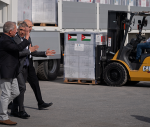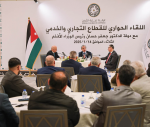You are here
EMRC ensures Jordan’s surface water sources are free of radioactive material
By JT - May 14,2023 - Last updated at May 14,2023
AMMAN — The Energy and Minerals Regulatory Commission (EMRC) has conducted a campaign to measure the levels of radioactive isotopes in surface water across the Kingdom, including dams, seas, rivers and ponds.
As part of the campaign, 21 samples were taken and sent to laboratories for analysis, bringing the total number of samples that were tested in 2023 to 194, the Jordan News Agency, Petra, reported.
By regularly conducting these tests, the EMRC can ensure that any potential sources of contamination are identified and addressed in a timely and effective manner.
EMRC Chairman of Board of Commissioners Ziad Saaideh said that the campaign’s aim is to ensure that surface water is free of radioactive pollutants, as the rainy season makes surface water more vulnerable to radioactive pollutant contamination than groundwater.
The campaign is part of a nationwide radiological environmental monitoring programme, designed by the EMRC and the International Atomic Energy Agency, to examine various environmental factors, Saaideh added.
He also emphasised the significance of the EMRC's 24-hour oversight role at all land, sea, and air border crossings, noting that the commission uses 89 radiological detection gates equipped with sophisticated devices to make sure that no radioactive sources are illegally brought into Jordan.
The chairman added that some 100 specialised employees detect and deal with any radioactive materials in accordance with the best practices and international standards for nuclear and radiological safety.
Related Articles
AMMAN — For the second time in three weeks, a shipment of radioactively contaminated pipes, with excess levels of Radium 226, was returned t
AMMAN — A shipment of radioactively contaminated pipes, with excess levels of Radium 226, was returned to its country of origin on Tuesday a
AMMAN — The Energy and Minerals Regulatory Commission (EMRC) reported revenues of JD3.3 million from the radiological and nuclear sector in
















